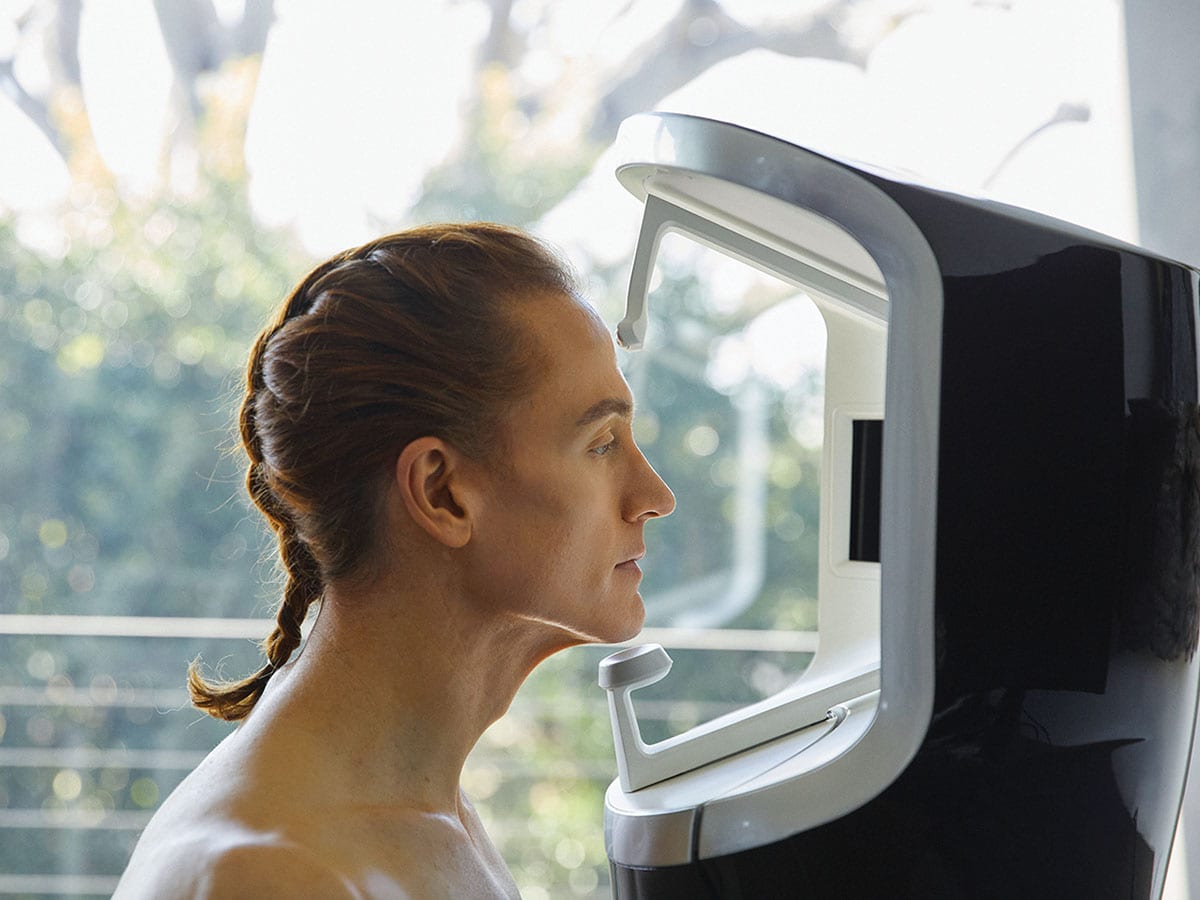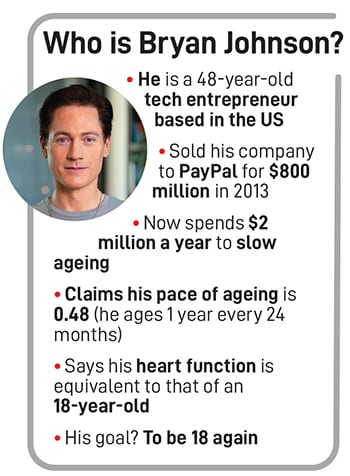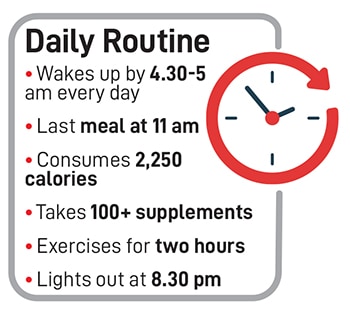AI will soon be our primary caretaker: Bryan Johnson
The longevity enthusiast on the future of healthcare, reverse ageing and what India can do to increase life spans


From a niche obsession of the ultra-rich to a fast-growing global industry, longevity is having its moment. Bryan Johnson, an entrepreneur who is spending $2 million a year to reverse ageing, believes artificial intelligence (AI) will fundamentally change how health care is delivered. Johnson was the subject of the 2025 Netflix documentary Don’t Die: The Man Who Wants to Live Forever. He has turned his body into a testing ground through Blueprint, which began as his personal longevity experiment and is now also a company that sells health supplements, bloodtesting equipment and other products tied to his own diet and protocol. The 48-year-old biohacker—who claims to have slowed his pace of ageing to 0.48 (which means he ages one biological year for every two that pass)—talks to Forbes India about his plans to bring Blueprint’s products to the country and why he thinks Indians’ biggest longevity challenge is the air we breathe. Edited excerpts:
Q. If we go back five or six years, longevity was a niche idea. Today it’s a global industry with billions of dollars flowing into it. What changed?
It probably has to do with confidence. Many people have seen the benefits of therapies like statin or hyperbaric oxygen therapy; or a PCSK9 inhibitor; or blood pressure medicines. Maybe that was the turning point—when people saw the evidence and believed this kind of science could work.
Q. How big a role will AI play in accelerating the longevity movement?
A big one. Google recently showed that AI was able to develop a novel solution for cancer identification—turning a ‘cold’ tumour ‘hot’ for the immune system to see. That defies what people have been saying so far, which is that AI is great at memorising things, but it can’t do new things. But Google’s model showed it can.
This means that AI can be a discovery tool. And if that’s the case, we might be able to solve certain things much faster than previously imagined.
Q. You have called ageing a ‘software problem’. What does that mean for health care? How do medicine and diagnostics evolve in a world where the body is an upgradeable system?
AI will change how we think about health care, it will help accelerate the shift (towards AI-based diagnosis and treatment). AI will be faster and more effective than our current systems and so people will naturally gravitate towards AI-based solutions to avoid dealing with bureaucracy or limitations of humans.
AI’s not perfect, it still falters, but the rate of improvement gives me confidence that over time, it will be our primary caretaker.
In my case, for example, my health is primarily taken care of by AI. Because we have so much data about my body it is hard for one doctor to keep all of it in their mind at any given time. And there are too many variables to consider: You have my genome, my methylation markers, my blood markers, saliva, stool toxins, etc. It is too complex to piece together in a holistic perspective.
Again, AI is not a magic box, but it does certain things that humans cannot. When we manage my health, we always double and triple check with AI.
Also Read: The new longevity hack: Not to live forever, but better for longer
Q. Let’s talk workplaces. If we are all productive into our 80s, how do corporations plan retirement benefits, leadership and succession?
That’s what’s so fascinating about this moment [the uncertainty]. Will any of us even have a job in 10 years? Maybe, maybe not.
It is such a wild moment to be alive. The pace of change is staggering. But one thing we all agree on is nobody wants to die. So, no matter what happens to our jobs, we will always care about our health.
Q. If we all live longer, how do governments plan for a world where resources are limited, but there are more people sharing them?
Predicting the future is hard and humans generally do a pretty terrible job of it.
There have been several times throughout history where people have worried about overpopulation and that we would eventually exhaust Earth’s resources. But right now we have an under-population crisis. We are not hitting replacement rates. Fertility rates are down by 50 percent over the last 50 years.
It is a confluence of many problems and it is not clear to me that overpopulation is the most imminent risk.
Q. Will longevity increase inequality because the rich would have access to the best tech? How do we make sure it doesn’t create another class divide?
If you look at the last three tech innovations—mobile phones, the internet and now AI—they have benefited the poor much more than the rich, just in terms of access. There’s still an imbalance of capital, in terms of the top 1 percent capturing it, but in terms of lower-income people getting access to information, access to possibility, I would say there have been positive developments with those.
Q. What’s the Plan B if Blueprint does not work?
Plan B is to go back to Plan A. Make it work.
Q. Do you have any plans to bring Blueprint to India?
I think it would be a good idea. Not immediately, but we should.
Q. Is there a timeline?
No, there isn’t. But it [this conversation] reminds me that I want to do it. I enjoyed being there [earlier this year] and I left feeling excited to do it.
Q. People have become more health conscious post Covid. We’re tracking everything: Glucose, macros, protein intake... what aren’t we tracking enough?
Probably inflammation. Inflammation is the root of most diseases, and it’s a good marker on how your body is doing overall.

Q. We have been hearing a lot about inflammation. Every second person I know has some sort of inflammatory condition…
Exactly. I think it’s rampant. We just don’t know how rampant it is because it’s a little bit harder to test. The wearables (that track core health metrics) are nice and easy. But the markers that require blood—either from a finger prick test or from a vein puncture—intimidate a lot of people. So it’s not tested enough.
Q. What is the one issue in India that is stopping people from living long, healthy lives?
Air quality. India would do more for its citizens by fixing air quality than curing all cancer.
Q .The Blueprint website mentions sleep, diet and exercise as the three pillars for a healthy life. Is that all that it takes to beat ageing?
Those are the power laws. The most powerful therapies in the world are high-quality sleep, daily exercise and good nutrition. Those are the big ones and they are the hardest [to follow].
Q. There are people who follow all the right steps and still die of a sudden heart attack and then there are people who eat junk all their life and still live long. Does that make you think that there is still a lot we don’t know about ageing?
There are some centenarians who will tell you that the secret to their longevity is a cigarette and Scotch every day. But these people live a long time despite their habits, not because of them. They are definitely an outlier. They just have good genes.
The science is clear: If you smoke, drink alcohol and eat junk food, you are going to shorten your lifespan.
First Published: Nov 24, 2025, 13:43
Subscribe Now
